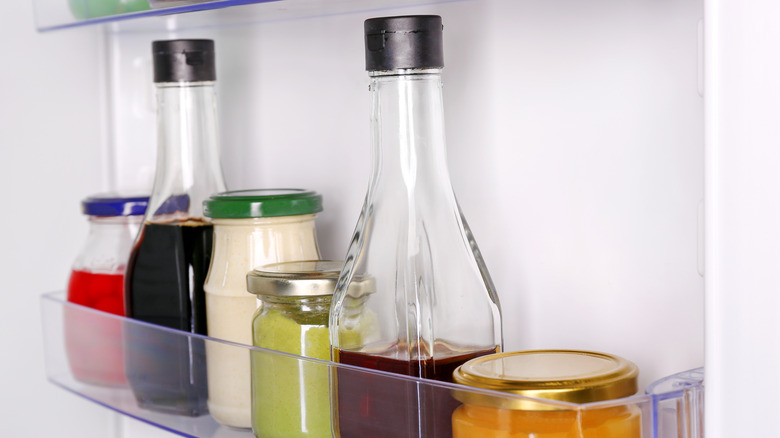It's Time To Stop Storing Soy Sauce Bottles In Your Pantry
Soy sauce is one of those essential ingredients that every home cook should keep on hand, as it's a ubiquitous addition to many Asian dishes. It also lends a salty, umami flavor to marinades, soups, and even Spicy Sweet Chili Doritos.
If you keep your opened soy sauce with your nonperishables in the pantry, you're not totally wrong. However, you could be doing it a disservice in terms of flavor, aroma, and appearance, especially if you don't reach for the bottle all that often.
As it turns out, most of us should be refrigerating our opened bottles of soy sauce, not keeping them in the pantry or on the counter. While most grocery store soy sauce does have the preservative sodium benzoate, if you aren't using enough soy sauce to go through a bottle per month, you should definitely be storing it in the refrigerator. That's because soy sauce stored at room temperature can oxidize, and that negatively impacts its flavor.
It's not a matter of safety, but flavor
Soy sauce is made today much the same way it was centuries ago; it's just not done by hand any longer, except in rare cases. It comprises four main ingredients: soybeans, salt, water, and wheat.
In a nutshell, the soybeans get a water bath before being steamed, then mixed with roasted, crushed wheat, salt, and Aspergillus, a special mold that promotes fermentation. After aging for a few months (more expensive soy sauces are aged for much longer), it's refined, preservatives such as sodium benzoate are added, and it's bottled and sent to store shelves.
The addition of sodium benzoate to mass-produced soy sauce means that refrigeration is not a matter of health and safety (except in some extreme cases, perhaps). What it is a matter of is how the soy sauce starts to taste — and ultimately, how any dish you use it for tastes.
Oxidation is the enemy of soy sauce
Oxidation occurs when soy sauce is touched by — you guessed it — oxygen. Exposure to oxygen causes superficial changes, like a darkening of color, but it also affects the taste and scent, especially after three to six months when stored outside of the fridge. Keep your soy sauce bottle in the refrigerator and you will slow the oxidation process, allowing the dark, salty liquid to stay at top-level freshness for much longer — a year or more.
And because some artisanal soy sauces don't contain preservatives like sodium benzoate (or other chemical add-ins) they should definitely be kept in the fridge to prevent oxidation and even a small chance of bacterial growth if left sitting out.
It's important to remember, too, that not even your fridge can entirely hold back the ravages of time. If you find an old opened bottle in the back of your refrigerator and it's three or more years past its expiration date, it has definitely oxidized and you should probably just toss it and buy a new one.


